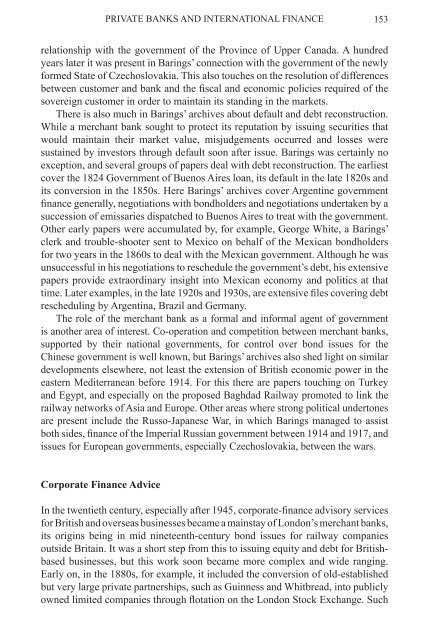the world of private banking
the world of private banking
the world of private banking
You also want an ePaper? Increase the reach of your titles
YUMPU automatically turns print PDFs into web optimized ePapers that Google loves.
PRIVAtE BANKS AND INtERNAtIONAL FINANcE 153<br />
relationship with <strong>the</strong> government <strong>of</strong> <strong>the</strong> Province <strong>of</strong> Upper Canada. A hundred<br />
years later it was present in Barings’ connection with <strong>the</strong> government <strong>of</strong> <strong>the</strong> newly<br />
formed State <strong>of</strong> Czechoslovakia. This also touches on <strong>the</strong> resolution <strong>of</strong> differences<br />
between customer and bank and <strong>the</strong> fiscal and economic policies required <strong>of</strong> <strong>the</strong><br />
sovereign customer in order to maintain its standing in <strong>the</strong> markets.<br />
There is also much in Barings’ archives about default and debt reconstruction.<br />
While a merchant bank sought to protect its reputation by issuing securities that<br />
would maintain <strong>the</strong>ir market value, misjudgements occurred and losses were<br />
sustained by investors through default soon after issue. Barings was certainly no<br />
exception, and several groups <strong>of</strong> papers deal with debt reconstruction. The earliest<br />
cover <strong>the</strong> 1824 Government <strong>of</strong> Buenos Aires loan, its default in <strong>the</strong> late 1820s and<br />
its conversion in <strong>the</strong> 1850s. Here Barings’ archives cover Argentine government<br />
finance generally, negotiations with bondholders and negotiations undertaken by a<br />
succession <strong>of</strong> emissaries dispatched to Buenos Aires to treat with <strong>the</strong> government.<br />
O<strong>the</strong>r early papers were accumulated by, for example, George White, a Barings’<br />
clerk and trouble-shooter sent to Mexico on behalf <strong>of</strong> <strong>the</strong> Mexican bondholders<br />
for two years in <strong>the</strong> 1860s to deal with <strong>the</strong> Mexican government. Although he was<br />
unsuccessful in his negotiations to reschedule <strong>the</strong> government’s debt, his extensive<br />
papers provide extraordinary insight into Mexican economy and politics at that<br />
time. Later examples, in <strong>the</strong> late 1920s and 1930s, are extensive files covering debt<br />
rescheduling by Argentina, Brazil and Germany.<br />
The role <strong>of</strong> <strong>the</strong> merchant bank as a formal and informal agent <strong>of</strong> government<br />
is ano<strong>the</strong>r area <strong>of</strong> interest. Co-operation and competition between merchant banks,<br />
supported by <strong>the</strong>ir national governments, for control over bond issues for <strong>the</strong><br />
Chinese government is well known, but Barings’ archives also shed light on similar<br />
developments elsewhere, not least <strong>the</strong> extension <strong>of</strong> British economic power in <strong>the</strong><br />
eastern Mediterranean before 1914. For this <strong>the</strong>re are papers touching on Turkey<br />
and Egypt, and especially on <strong>the</strong> proposed Baghdad Railway promoted to link <strong>the</strong><br />
railway networks <strong>of</strong> Asia and Europe. O<strong>the</strong>r areas where strong political undertones<br />
are present include <strong>the</strong> Russo-Japanese War, in which Barings managed to assist<br />
both sides, finance <strong>of</strong> <strong>the</strong> Imperial Russian government between 1914 and 1917, and<br />
issues for European governments, especially Czechoslovakia, between <strong>the</strong> wars.<br />
Corporate Finance Advice<br />
In <strong>the</strong> twentieth century, especially after 1945, corporate-finance advisory services<br />
for British and overseas businesses became a mainstay <strong>of</strong> London’s merchant banks,<br />
its origins being in mid nineteenth-century bond issues for railway companies<br />
outside Britain. It was a short step from this to issuing equity and debt for Britishbased<br />
businesses, but this work soon became more complex and wide ranging.<br />
Early on, in <strong>the</strong> 1880s, for example, it included <strong>the</strong> conversion <strong>of</strong> old-established<br />
but very large <strong>private</strong> partnerships, such as Guinness and Whitbread, into publicly<br />
owned limited companies through flotation on <strong>the</strong> London Stock Exchange. Such












![[Pham_Sherisse]_Frommer's_Southeast_Asia(Book4You)](https://img.yumpu.com/38206466/1/166x260/pham-sherisse-frommers-southeast-asiabook4you.jpg?quality=85)



